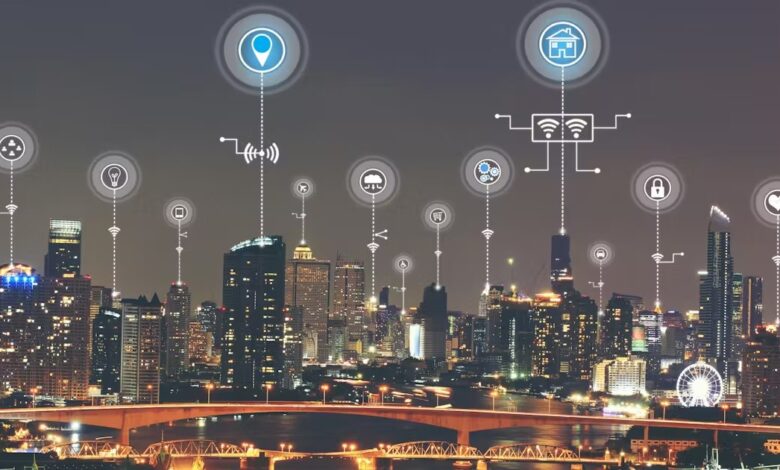
IoT is revolutionizing smart cities by integrating advanced technology into urban infrastructure, transforming the way cities operate and provide services. Internet of Things (IoT) devices enable seamless communication between various systems, collecting and analyzing data to enhance decision-making and improve quality of life. From traffic management and energy efficiency to public safety and waste management, IoT is shaping the future of urban living.
As cities grow, the demand for smarter solutions to address urban challenges becomes more critical. IoT-powered technologies offer innovative tools to optimize resources, reduce costs, and ensure sustainability. This article explores how IoT revolutionizing smart cities, detailing the impact of these advancements across key sectors, including transportation, healthcare, utilities, and environmental management.
Read More: How IoT is Revolutionizing Smart Cities
The Role of IoT in Urban Transformation
IoT is revolutionizing smart cities by enabling data-driven urban management and fostering interconnected systems that improve city operations.
IoT devices collect real-time data from sensors, cameras, and other sources, empowering city planners to make informed decisions. These systems optimize resource allocation, reduce inefficiencies, and improve service delivery across sectors, including transportation, utilities, and public safety.
IoT in Smart Traffic Management
IoT is revolutionizing cities by transforming traffic management systems, ensuring smoother and safer transportation networks.
Connected sensors and cameras monitor traffic flow, adjust signals, and provide real-time updates to commuters. These systems reduce congestion, minimize travel time, and enhance road safety, promoting efficient and sustainable mobility solutions.
IoT-Powered Public Safety Systems
IoT is revolutionizing smart cities by enhancing public safety through advanced monitoring and rapid response capabilities.
Connected devices like surveillance cameras, emergency alert systems, and predictive analytics tools enable authorities to detect and respond to incidents quickly. These technologies ensure safer communities by preventing crime and mitigating risks.
Smart Utilities Management with IoT
IoT is revolutionizing smart cities by improving the efficiency of utility systems, including water, electricity, and gas.
IoT-enabled smart meters and sensors monitor consumption patterns, detect leaks, and optimize distribution. These innovations reduce waste, lower costs, and enhance service reliability, contributing to sustainable urban living.
IoT in Waste Management
IoT is revolutionizing smart cities by streamlining waste management processes, reducing environmental impact, and improving sanitation.
Sensors in waste bins monitor fill levels, enabling optimized collection routes. These systems reduce operational costs, minimize emissions, and ensure cleaner urban environments, aligning with sustainability goals.
Smart Environmental Monitoring
IoT is revolutionizing smart cities by providing real-time insights into air quality, noise levels, and other environmental factors.
IoT sensors track pollution and alert authorities to address issues promptly. These technologies promote public health and support urban planning efforts aimed at creating greener, more livable cities.
IoT-Enabled Smart Buildings
IoT is revolutionizing smart cities by making buildings more energy-efficient, secure, and comfortable.
Smart systems control lighting, heating, and security based on occupancy and usage patterns. IoT-powered buildings optimize resource use, reduce energy costs, and enhance tenant satisfaction, contributing to sustainable urban development.
IoT in Smart Healthcare Systems
IoT is revolutionizing smart cities by transforming healthcare delivery, ensuring better access to services and improved patient outcomes.
Connected devices monitor patient health, support telemedicine, and manage hospital operations efficiently. These technologies enable proactive care, reduce costs, and enhance healthcare accessibility in urban areas.
IoT for Urban Energy Management
IoT is revolutionizing smart cities by optimizing energy consumption and integrating renewable energy sources.
Smart grids use IoT to balance supply and demand, monitor energy flow, and prevent outages. These systems support sustainability by reducing carbon footprints and promoting efficient energy use.
IoT in Urban Transportation Systems
IoT is revolutionizing smart cities by enhancing urban transportation with connected vehicles, smart parking, and real-time navigation.
These technologies reduce congestion, lower emissions, and improve commuter experiences. IoT-enabled transportation systems are pivotal in creating efficient, sustainable mobility networks.
IoT in Citizen Engagement Platforms
IoT is revolutionizing smart cities by fostering better communication between governments and residents through citizen engagement platforms.
These platforms collect feedback, disseminate information, and enable two-way interaction, improving public participation in decision-making. IoT enhances transparency and trust in governance.
IoT for Disaster Management
IoT is revolutionizing smart cities by improving disaster preparedness and response through advanced monitoring and alert systems.
Sensors detect natural hazards like floods, earthquakes, or fires, providing early warnings to minimize damage. IoT technologies ensure quicker, coordinated responses, safeguarding lives and property.
IoT in Water Management
IoT is revolutionizing smart cities by addressing water scarcity and ensuring efficient water resource management.
IoT devices monitor water usage, detect leaks, and optimize irrigation systems. These technologies promote conservation, reduce waste, and support sustainable water management practices.
IoT in Smart Retail Environments
IoT is revolutionizing smart cities by transforming retail spaces with personalized shopping experiences and efficient inventory management.
Connected devices track customer preferences and optimize store layouts. IoT enhances operational efficiency and boosts customer satisfaction, driving innovation in urban retail.
IoT for Urban Security Infrastructure
IoT revolutionizing smart cities by strengthening urban security through intelligent infrastructure and connected systems.
Technologies like facial recognition, real-time surveillance, and automated access control ensure secure public spaces. These systems enhance urban safety and instill confidence among residents and visitors.
IoT in Transportation Payment Systems
IoT revolutionizing smart cities by simplifying public transportation payments with contactless and mobile payment solutions.
Integrated payment systems improve user convenience and streamline operations. These technologies support efficient, hassle-free commuting in urban areas.
IoT in Sustainable Urban Farming
IoT revolutionizing smart cities by enabling sustainable urban agriculture through precision farming and vertical gardens.
Connected devices monitor soil quality, water usage, and plant health, optimizing agricultural productivity. IoT promotes local food production and reduces the environmental impact of urban farming.
IoT for Urban Mobility Solutions
IoT revolutionizing smart cities by creating smarter mobility options like bike-sharing and autonomous vehicles.
IoT technologies track vehicle locations, manage fleets, and ensure efficient utilization. These solutions reduce congestion and promote eco-friendly commuting alternatives.
IoT in Educational Institutions
IoT is revolutionizing smart cities by enhancing learning experiences in educational institutions through connected classrooms and interactive tools.
Smart devices enable real-time collaboration, personalized learning, and resource management. IoT supports innovative teaching methods, preparing students for a technology-driven future.
Future Trends in IoT-Driven Smart Cities
The future of IoT is revolutionizing smart cities by advancing technologies like AI, 5G, and edge computing for greater efficiency.
These trends promise enhanced connectivity, predictive analytics, and autonomous systems, further transforming urban living. As IoT evolves, its impact on smart cities will continue to grow, shaping a more sustainable and connected future.
Read More: How IoT is Revolutionizing Smart Cities
Conclusion
IoT is revolutionizing smart cities by integrating advanced technologies into urban systems, improving efficiency, sustainability, and quality of life. From traffic management and healthcare to energy and public safety, IoT-powered solutions are addressing critical urban challenges. These innovations not only enhance functionality but also foster community engagement and environmental stewardship.
As IoT technologies evolve, their potential to revolutionize smart cities will expand, driving innovation and transforming urban landscapes. Embracing IoT offers opportunities to create smarter, greener, and more inclusive cities, paving the way for a connected and sustainable future.
FAQs
1. How is IoT revolutionizing smart cities?
IoT enhances connectivity, optimizes resources, and improves urban management through real-time data collection and advanced analytics.
2. What are the benefits of IoT in urban environments?
IoT promotes sustainability, efficiency, and safety by enabling smarter transportation, energy management, and public services in cities.
3. How does IoT improve public safety in smart cities?
IoT uses connected devices like surveillance cameras and emergency alert systems to detect risks and enable rapid responses.
4. What role does IoT play in waste management?
IoT monitors waste levels and optimizes collection routes, reducing operational costs and minimizing environmental impact.
5. What is the future of IoT in smart cities?
The future involves advanced technologies like AI and 5G, enabling predictive analytics, enhanced automation, and greater urban efficiency.











